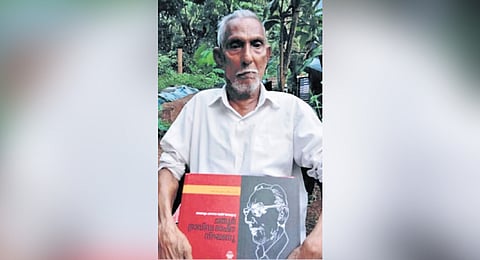

KANNUR: Compiling a dictionary is an arduous task that demands years of research, linguistic expertise, and an unwavering commitment to accuracy. Typically, it is a scholarly pursuit undertaken by academics with vast resources at their disposal. However, 86-year-old Njattyela Sreedharan, a native of Thalassery and a fourth-grade school dropout, achieved this extraordinary feat single-handedly – defying all odds. In 2020, he published the Chathur Dravida Bhasha Nighandu, a dictionary of four Dravidian languages.
Despite his unparalleled contribution to linguistic scholarship, the state government has failed to recognise his efforts. Although the Kerala Bhasha Institute republished the dictionary in 2022, Sreedharan is yet to receive any royalties. While institutions in other states have honoured him, he still awaits official recognition from his home state.
“I spent 40 years compiling the dictionary,” says Sreedharan. “I travelled to Karnataka and Andhra Pradesh, spending months there to study the languages. Many, including close friends, discouraged me, insisting that dictionary compilation was a task for scholars. I may not be a scholar. I may not have a PhD. Yes, I am a fourth-grade dropout. But I love languages. I dedicated years to learn them, and that cannot be ignored,” he points out.
After leaving school, Sreedharan worked as a beedi roller. His passion for languages began during his time in the CPM’s children’s wing, Balasangam, where he learned to write Malayalam. Later, while working in Palakkad, he taught himself to read and speak Tamil.
It was in Palakkad that his desire to master all four Dravidian languages took root. “I used to read Tamil textbooks to familiarise myself with the language. One lesson emphasised the importance of learning other Dravidian languages alongside Tamil.
Tamilians take immense pride in their language, and they were the ones advocating for learning others as well. Around the same time, I read an essay by Dr K N Ezhuthachan, who argued that true pride in Malayalam comes from understanding other Dravidian languages. That was my wake-up call. I resolved to learn Telugu and Kannada, too,” he recalls.
By the 1980s, Sreedharan realised that no comparative study of Dravidian languages had been published, inspiring him to create the dictionary. However, self-doubt held him back. “The inferiority complex of a fourth-grade dropout kept me from sharing my work. When my friends eventually found out, they discouraged me, just as I had feared. But when newspapers began writing about my mission, I decided to persist,” he said.
Publishing the dictionary proved an uphill battle. Publishers rejected his manuscript after learning about his lack of formal education. “I still remember the face of an editor from a reputed publishing house when they realised I had only studied up to the fourth grade,” he recounted.
Eventually, in 2020, the Chathur Dravida Bhasha Nighandu was published by the Kerala Senior Citizens Forum. All 500 copies sold out within two weeks. Following the intervention of then chief secretary K Jayakumar, the Kerala Bhasha Institute republished the dictionary, ensuring wider circulation.
Sreedharan’s lifelong passion for Dravidian languages came at a financial cost.
“I spent lakhs on research, travelling to Andhra Pradesh and Karnataka to immerse myself in the languages. This work gave me nothing in return. My family struggled financially, especially when my children were studying. I was our sole breadwinner, but my wife managed the household without complaints. She never questioned why I was writing instead of working,” he said.
His story was featured in the national award-winning documentary, Dreaming of Words, directed by Nandan.